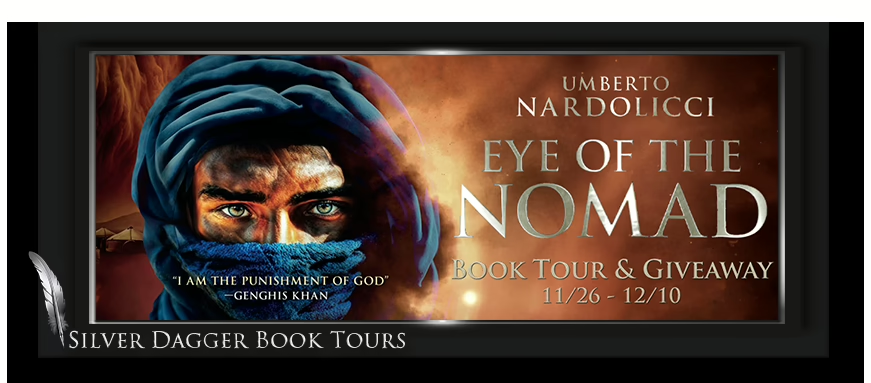
A young prince begins his quest for purpose in this epic first installment in the War of Fear Historical Fiction Trilogy
Eye of the Nomad
War of Fear Book 1
by Umberto Nardolicci
Genre: Historical Fiction
#1 New Release in Historical Asian Fiction
Based on actual events surrounding Genghis Khan’s death squad of special operators, known as The Mangoday, this historic saga immerses the reader in a spellbinding tale of life, love, and revenge that will leave you breathless…
Book I, Eye of the Nomad, so begins the legend of Yasotay, a gifted young prince whose search for purpose takes a dramatic turn saving an illiterate nomad from captivity. He embarks on a hero’s journey far from home to learn the true meaning of life. Murder, kidnapping, and revenge soon find Yasotay in a thrilling race against time to save someone he loves from a fate worse than death.
Author Umberto Nardolicci takes the reader to the 12th-century Eurasian Steppe in this heart-pounding tale of adventure.
What readers are saying:
“A superbly written and researched tale of high adventure and deeply felt family and tribal ties.”
-Goodreads Reviewer
“Have an interest in historical fiction? War of Fear is a must-read… The character development and portrayal of the times in which the characters lived make for an exciting and wondrous read. The stage is set, the anticipation palpable; I am very much looking forward to reading the next book in the series.” – Goodreads Reviewer
“This book truly kept me on my toes. The writing was so vivid and descriptive that I felt like I was physically present in each scene.” – Amazon Reviewer
“Eye of the Nomad is a riveting story that will keep you hooked from its beginning through to the last page. The story not only offers intrigue, heroism and passion, it also presents an incredible history lesson into one of the most mystifying and exciting periods of human existence.” – Goodreads Reviewer
Book Links:
Amazon: https://www.amazon.com/gp/product/B0DLT2YJP6
Bookbub: https://www.bookbub.com/books/eye-of-the-nomad-war-of-fear-book-1-by-umberto-nardolicci
Goodreads: https://www.goodreads.com/book/show/212062260-eye-of-the-nomad
Book Trailer:
Excerpt:
Jin, Capital of Zhongdu, late spring, 1165 CE
Feet spread shoulder-length apart, Emperor Shizong, dark-haired and clean-cut, peered down at the ornate stick in the grip of his delicate, privileged hands.
“I am intrigued by this…this child and his potential,” proclaimed Shizong, appearing relaxed and focused on playing his game of chuiwan.
The eyes of the sixty or so guests in attendance were glued to the emperor’s every move. The tip of Shizong’s tongue slightly protruded from the left corner of his mouth as he concentrated on aligning the f at end of his stick with the wooden ball at his feet.
He was comfortable performing in front of a crowd. His next move was to strike the ball toward the hole in the lawn, two-and-a-half paces away, all the while trying to converse with Master Chang, which was proving to be a challenge for the priest.
“It’s all very interesting, my emperor,” responded Chang, mildly irritated by the lapses in their conversation. This silly game is a distraction; why did he call me here? “My emperor, I am still unsure how you see this child relating to our efforts?”
Chang’s formal, deep-red daopao robes, tied at his lean waist by a black dadai belt, and his simple black hat topped with a round, silver pin made him appear positively priestly.
Chang was shadowed by his watchful and silent lead assistant, Master Gao, who was nearly identical in appearance and stance. The priest maintained a respectful tone and a pleasing smile with the emperor, but the beleaguered look on his usually kind face betrayed his frustration.
“He’s an amazing young man,” said Shizong. Noticing Chang’s irritation, a wry smile formed on the emperor’s face, whose prickly whiskers ran around his mouth and down to his chin.
He mumbled something as if he were talking to himself. Focusing on the immediate challenge, he lightly struck the ball with his jewel-encrusted stick. The perfectly round wooden ball, not much bigger than a walnut, rolled toward the hole in the lawn six chi away.
The eyes of everyone in attendance were fixated on the ball as it moved across the well-manicured grass toward the impeccably cut round hole, measuring just under a half chi in diameter and depth.
“Go…IN…,” playfully exclaimed the emperor. A smile spread from his pursed lips into a broad grin as the ball approached the hole. The emperor quickly stepped forward in unison as the ball spilled into the hole, making a hollow, cavernous noise as it hit the bottom of the wooden cup.
Light applause erupted in the south garden from the guests gathered to watch their emperor play chuiwan with the elegant Lady Shimo. Only those in his favor were allowed the privilege of observing today’s game in the blistering sun.
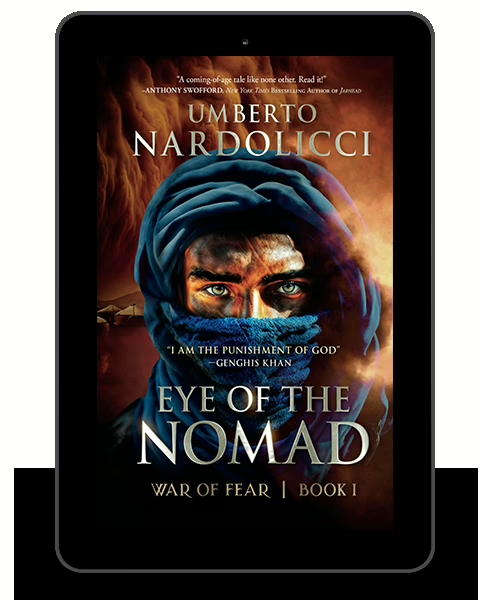
The midday shadows sheltered small portions of the south garden, giving shade to just a fortunate few. Today’s parade of gentry, arrayed in their colorful hanfu, comprised almost all the fashionable elite of the 12th-century Jin Empire.
“I think he’s adorable,” purred Lady Shimo, the emperor’s kittenish courtesan whose floral-red, exquisitely designed hanfu hung down in the back, making her look as if she had a tail.
“I asked him about the Buddha, and his answer was, was…precious.” Then, the pretty paramour, whose apple-red cheeks and plump round bottom had won the emperor’s favor, brought her stick back and struck her ball toward the same hole.
“See, I think the fair lady is infatuated with the young boy, and I think you will be too, Chang,” said the emperor as he admired Lady Shimo’s sultry body move sprightly with the roll of her ball directly into the hole at his feet.
“Nice shot!” exclaimed the emperor with a playful grin that showed his pearly white teeth. All those in attendance, while subdued, did show their appreciation with nods, hand gestures, and verbal displays of approval.
“You will see, Master Chang, you will see!” chided the emperor as he retrieved his ball from the hole. “Have you ever played chuiwan?” he asked the priest. “It originated hundreds of years ago; I think it was called buda in the Tang Dynasty…it’s great fun!”
“I look forward to meeting him, my Emperor,” replied the venerated Master Chang, who was one of the North’s seven most respected and venerated Taoist priests. As a disciple of the most revered Master Wang Chong, he was no ordinary priest. “And no, my Emperor, I have never had the pleasure of playing chuiwan.”
“That’s three hits for you and four for me, Wulu. You always win,” Lady Shimo teased in a playful voice. Hearing her use his intimate name, never used in public, made his cheeks flush just a little.
The emperor handed his ornate stick to one of the eunuch assistants among the crowd of those waiting to serve him. Eunuchs attended to his every need, from consoling him on military machinations to wiping his nether region. They were a valued commodity within the imperial palace.
“Oh, here he is now!” exclaimed Lady Shimo loudly, her baby face bubbling and body bouncing while she excitedly clapped her hands in a light and rapid fashion.
Princess Jia and her son Yasotay entered the sun-soaked south lawn through the Moon Gate, a large circular opening in the garden wall covered in tangled green vines and adorned with hundreds of little white flowers.
It was one of the main entrances to the emperor’s residence. A woman, who appeared to be somewhat older than the princess, followed two paces behind the pair, a governess to the young boy.
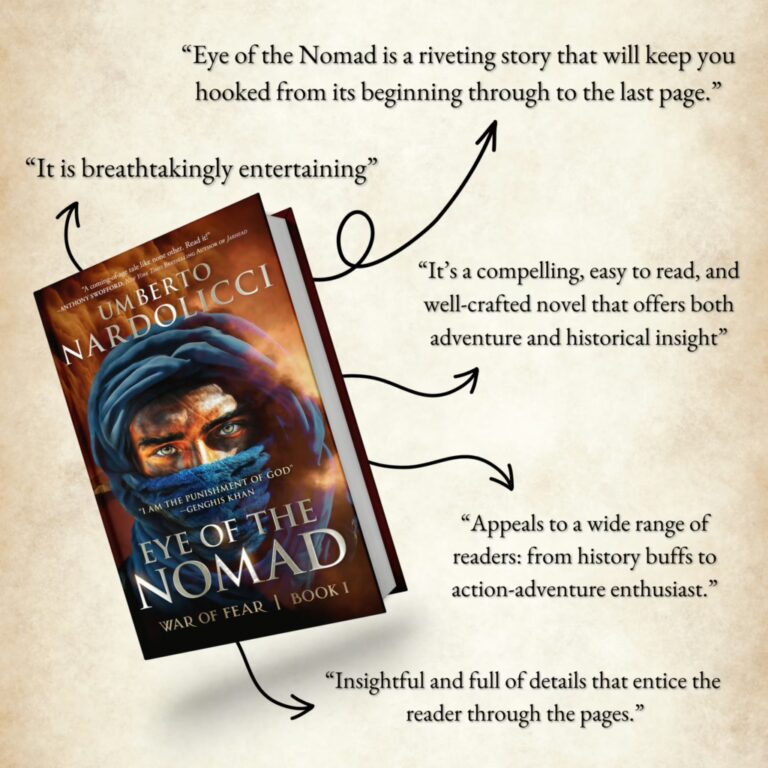
Princess Jia was radiant in her flowing, floor-length, deep royal blue silk hanfu. The gold-colored piping around its edges matched the intricately folded gold sash around her middle.
Her delicate footwear, also gold with royal blue stitching, rounded out the stunning and well-planned presentation of the twenty-year-old princess as she walked through the Moon Gate. With every intricate detail of her beautiful face, thin lips, large brown eyes, and attire fashioned
to present a very delicate, refined, and contrived look, her natural beauty was almost obscured.
“Princess Jia and young Yasotay, I would like to introduce you to Master Chang,” said the emperor.
“It is my pleasure to meet you, Princess Jia, and certainly you, young Yasotay!” greeted Chang. “I have already heard so much about you.”
While he deeply bowed, a small pair of round hazel eyes, those of the five-year-old child’s, calmly held Chang’s gaze.
The child’s face had been dusted with a thin coat of white powder, making his eyes and their startling hazel hue stand out.
Dressed in a plain cream tunic with a blood-red sash around his middle to match his silk trousers, the young boy responded, “It is also an honor to meet you, Master Chang.”
Princess Jia, reflexively fussing with and straightening the bottom of Yasotay’s jacket, noticed the prized dragon figurine held tightly in the boy’s hand.
Princess Jia hissed and whispered in an aggravated tone, “Yasotay, give me that.” The green figurine seemed enormous compared to his tiny hands. The boy refused, tightened his hold, and looked to his governess instead.
Mana held out her hand and smiled kindly at him with warm eyes, and Yasotay handed the dragon over. Chang looked on at this exchange and smiled.
“Good, now we’ll show what this young boy can do. Let’s see,” the emperor paused, thinking, “What can I ask him?”
Cupping the palm of his hand under his chin with his fingers on his cheek, he was thinking intently, getting straight to the task at hand.
Yasotay looked to Mana, and she responded with a slight affirmative nod and another warm, encouraging smile. The young man turned his attention back to the emperor and Master Chang.
“I have one,” proclaimed the emperor to Master Chang. “I have a question for young Yasotay, which will honor you and your interest in ethical matters.”
Chang bowed in appreciation. Ten, the emperor looked directly at Yasotay and said, “I would like you to recite section seventy-four of the Tao Te Ching.”
“Stand up straight and answer the question!” ordered Princess Jia to her son, who was already standing perfectly straight.
Yasotay took one small step forward and began to speak, “If men are not afraid to die, it is of no avail to threaten them with death. If men constantly fear dying, and breaking the law means a man will be killed, who will dare break the law? The official executioner kills. Substituting him is like substituting the master carpenter who carves; you can do so, but one rarely escapes harm.”
“Very well said. Well done, young man!” responded Chang with a broad smile, mildly surprised that this child, whose appearance and doll-like performance conjured thoughts of a trained monkey, could articulate so clearly from the great works of Master Lao Tzu.
“But do you know what it means?” asked Chang in a jocular tone bordering on sarcasm.
“All creatures fear death,” said Yasotay matter-of-factly. “Master Lao knows that each of us fghts our own internal war of fear. Once cornered by death, both man and beast do but one of two things: fight with fury or cower in fear!”
The young man paused for a moment in thought. “Plagues, wars, and famine make death a daily reminder; people lose faith…they cower.
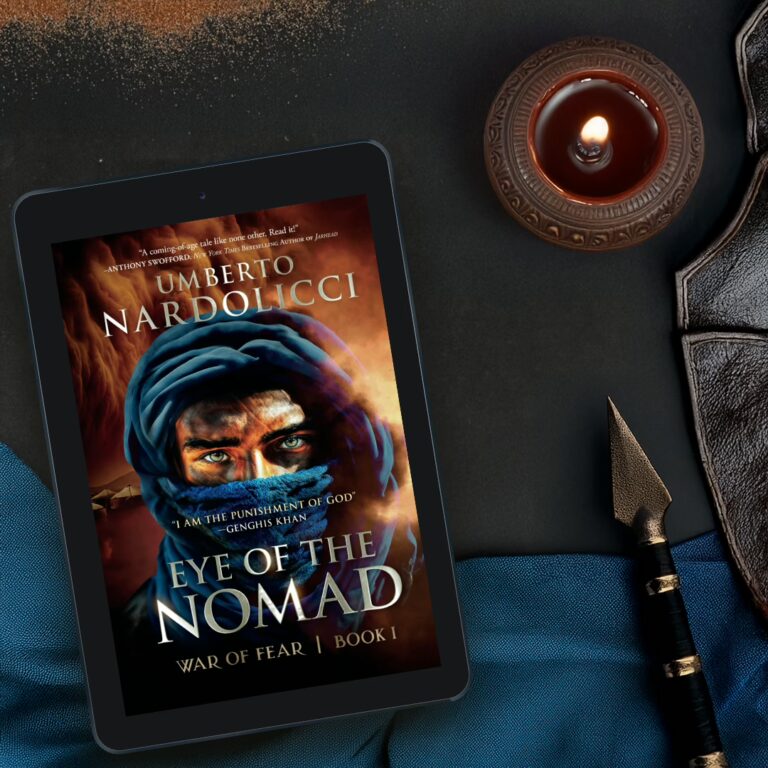
Master Lao was speaking to those in authority, those leaders who choose to kill deviants, and others who disobey the law.
Leaders must be careful not to create too much fear within those they lead, lest they become immune to death as a deterrent, which makes them more inclined to strike out in response.
Teir yearning for a supreme god and the hope for something or someplace better renews faith! Therefore, the belief in a god is both useful and difficult when managing the affairs of state.”
His young voice changed tempo when he expressed the afterthought, “The closing point, referencing the master carpenter and the executioner, merely argues that those trained and conditioned for killing are best kept to their calling.”
Chang’s long, clean-shaven face began to change color, turning visibly red. His visions of a trained monkey were long gone. Not sure what to say, mouth gaping wide, totally surprised, he instinctively responded, “Yes, well, I agree, interesting, and thank you for that!”
“He’s a bit of a know-it-all,” proclaimed the emperor, breaking up the awkward moment. “But I believe that if you are building this library of all known knowledge, as you put it, to discover some supreme singular…”
“My Emperor!” interrupted Chang, speaking over him. One of the eunuchs drew his breath in loudly at this breach of protocol. No one ever interrupts the emperor.
“Yes, I know, Chang, secrecy and all, but someone like young Yasotay here could be a valuable addition to our efforts.” The emperor did the signature twirl of his chin whiskers with the side of his left index finger.
“Your staff seems less than satisfactory for this effort! Have you considered bringing on others?” asked the emperor, giving Yasotay an affectionate pat on the back while extending a dubious glance at the less-than-satisfactory Gao.
The emperor’s slight was received loud and clear by Chang’s principal assistant, who just stood there, silently observing their interactions. His teal-colored daopao, typical Taoist attire, was aged and slightly faded but with perfect folds and creases.
“Yes, Emperor, I understand your point,” said Chang with a nod, not actually comprehending the point or even thinking about an answer. Still, the bewildered look on his face revealed much. Chang was struggling to understand what he had just witnessed with this child.
“He is still too young,” said Princess Jia hesitantly. “The emperor must be talking about once he is of age for such things.”
“Yes, obviously, Jia, I’m not looking to pull the baby from the breast,” the emperor conceded.
After expressing an odd look of surprise and confusion with his brow furrowed, he continued, “It seems that for now, Master Chang will have to rely on understudies who are hopefully smart enough to understand what we are handsomely paying to collect.”
Then, as an additional intentional insult, the emperor mocked Chang, whispering, “…and, more importantly, for what purpose we labor.”
“How old is he, four or five?” asked Chang incredulously.
“He was five just two weeks ago,” said Princess Jia.
“Five years old!” Chang hesitated for a moment to bring his emotions under control. “Young Yasotay is many years away, and I would certainly welcome him when the time comes, Emperor…I deeply apologize for any misunderstanding.”
Chang’s long face softened. “But if there is nothing further, I must take my leave.” Chang bowed deeply and awaited the emperor’s dismissal.
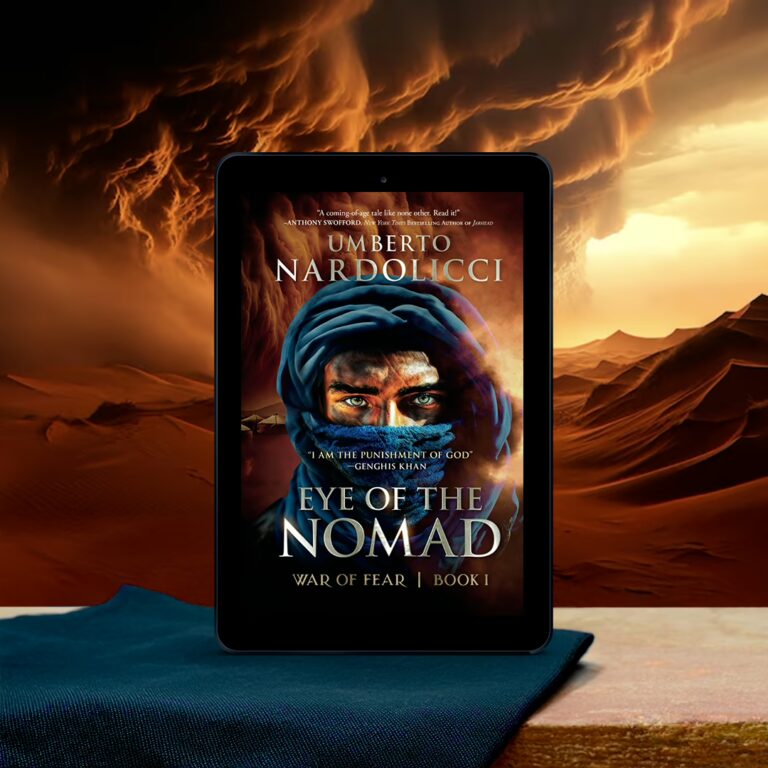
The emperor feigned a nod of assent and quickly turned away, which told the priest, You are fine, leave. Chang bowed for the last time toward Princess Jia and Yasotay.
Then, giving the boy one long, last look, he slipped out quietly with his shadow, Gao, trailing closely behind.
“I had heard of this child, but I wasn’t expecting THAT,” whispered Gao to Chang, dumbfounded, as they walked quickly through the Moon Gate and out of earshot from the gathering.
“What was that?” Chang exclaimed in a low, exasperated tone, seemingly speaking to himself. “That child spoke as if he possessed the intellect of an ageless master! His tone and the confidence in his voice sounded more like those of a very mature and learned person!”
“Who is he?” asked Gao, whose low tone and mannerisms seemed to replicate Chang’s, just in a younger version.
“He is the second cousin to the emperor, Princess Jia being the emperor’s first cousin.”
“Who is his father?” asked Gao, “that child looks different!”
“I don’t know.” Chang’s eyes narrowed, his brow furrowed in confusion. “Princess Jia’s husband died soon after she was wed. All I know is she left Zhongdu for the port city of Pingzhou after her husband’s death and returned a year later with his child.”
“His facial features look a little odd,” added Gao, “he almost looks foreign.”
Chang ignored this comment. “That had to be some sort of trick,” mused Chang out loud. “I could swear I’ve read a similar opinion of Master Lao’s work.”
“Are you saying he memorized some obscure commentary on section seventy-four of the Tao Te Ching?” asked Gao. “Who would do that?”
“I don’t know what I’m saying. Maybe the emperor gave him the question in advance,” said Chang.
The priest hesitated momentarily, then continued, “Gao, I want you to talk to our friends and find out as much as you can about this child prodigy. Who his father is, his history, everything.”
“Yes, Master Chang, I will attend to it!”
“What of the emperor breaking protocol and mentioning our project in public?” asked Gao.
“What of it?” replied Chang sharply. “He can tell what we do to everyone if he likes.”
“I don’t trust those around him! Tey latch on to him like parasites stealing crumbs from the sides of his mouth,” said Gao.
“Those fools know what we do, but it doesn’t matter. It doesn’t change anything!”
Giveaway:
$10 Amazon
Follow the tour HERE for special content and a giveaway!
https://bit.ly/EyeOfTheNomadTour
About The Author:

Born in upstate New York, Umberto Nardolicci is a computer engineer and businessman.
After completing service with the US Navy in 1986, he worked as an engineering consultant at Johns Hopkins University, Applied Physics Laboratory in the Advanced Systems Design Group.
He received his degree in Computer Science and Information Systems from the State University of New York (ESC) and, after some brief independent consulting “gigs,” co-founded Systems Made Simple (SMS) in 1991.
He managed daily operations and P&L responsibilities within SMS for 20 years as Chairman of the Board, President, and principal founder.
During his tenure, SMS evolved from a ‘garage startup’ to an industry-leading Federal Health IT Company with employees nationwide and over 350 million in sales.
SMS achieved INC 5000 honors six years running, with INC 500 honors in two of those years until its “Entrepreneurial American Dream” sale to Lockheed Martin in the Fall of 2014.
During his five-year forced sabbatical from Health IT, he focused his full-time efforts on writing War of Fear.
He put a great deal of research into this effort, which actually spans over 40 years, and began with his initial foray into martial arts and the teachings of Eastern philosophies.
Nardolicci is a disabled veteran, like his father and one of his two sons. He also has numerous relatives and friends who are veterans or currently serving in the military.
He is committed to supporting veteran organizations such as the Wound Warrior, Tunnels2Towers, Nardmoor, and the DAV.
Website * Facebook * Instagram * Amazon * Goodreads
Author Links
Website: https://waroffear.com/
Facebook: https://www.facebook.com/waroffeartrilogy
Instagram: https://www.instagram.com/waroffear
Amazon: https://www.amazon.com/stores/Umberto-Nardolicci/author/B0DNQCTLF7
Goodreads: https://www.goodreads.com/author/show/49485233.Umberto_Nardolicci

